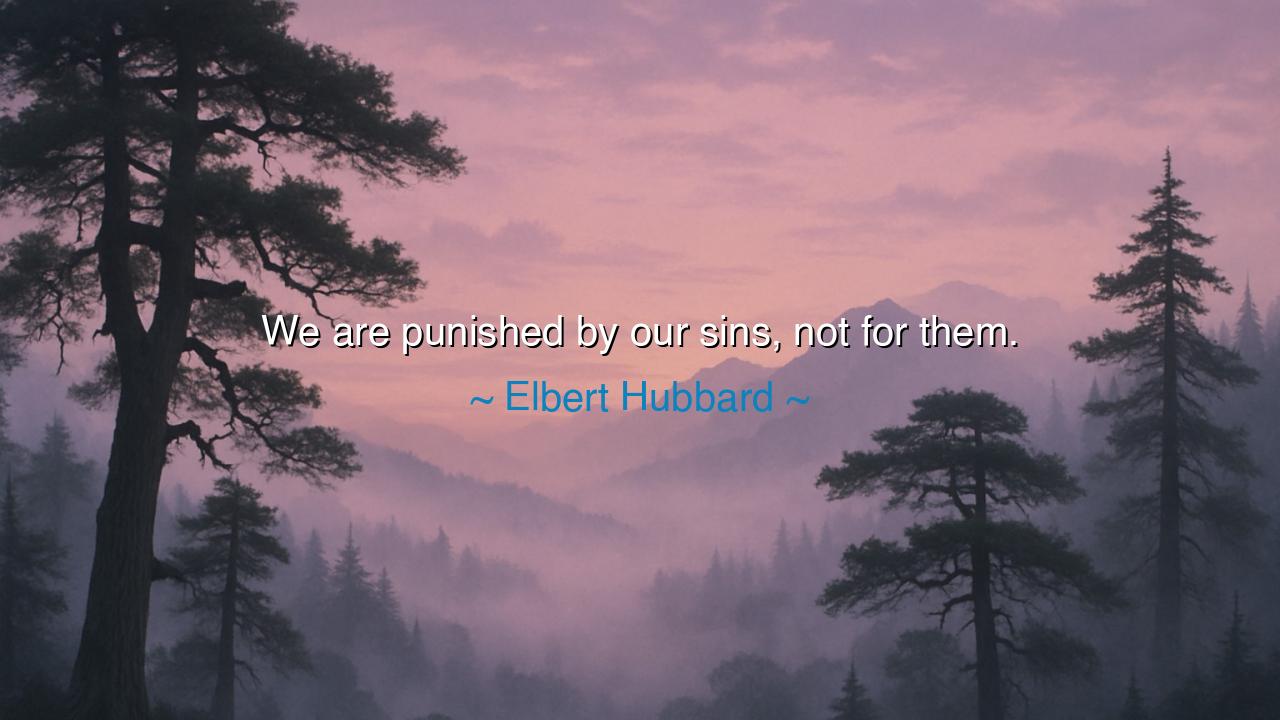
We are punished by our sins, not for them.






“We are punished by our sins, not for them.” — So declared Elbert Hubbard, the philosopher and craftsman of the early twentieth century, whose pen often cut deeper than the sword. In this single line, he revealed a timeless truth about the nature of wrongdoing and consequence. He reminds us that the universe does not need to strike us down for our errors; the punishment lies already within the act itself. Every sin, every untruth, every cruelty carries its own poison — and the soul that commits it becomes its first victim.
In the old way of thinking, men imagined punishment as something inflicted from above — a divine retribution hurled down from the heavens. But Hubbard’s wisdom turns the gaze inward. He shows us that sin is not an external offense but an internal corruption, a seed that bears bitter fruit within the heart. To lie is to live under the burden of deceit; to hate is to carry one’s own torment; to envy is to drink one’s own poison. The pain does not wait for judgment — it begins the very moment the wrong is done. The universe, in its quiet justice, allows every act to contain its own echo.
Consider the man who betrays a friend. The world may never know of his treachery; no court may condemn him. Yet when he meets the eyes of honesty, he cannot stand their light. He carries within him the restless weight of guilt, the slow corrosion of spirit that no wealth or applause can erase. He is already punished — not for his sin, but by it. His soul becomes the battlefield where peace and truth are slain by his own hand. So too, the greedy man who hoards his gold may think himself secure, but his heart grows cold, his sleep uneasy, his joy hollow. The punishment lives inside him like a ghost that will not depart.
This truth has echoed across the centuries in many tongues. The ancient Greeks spoke of Nemesis, not as a vengeful goddess, but as the natural balance of the cosmos — the law that restores harmony when mortals overstep it. The Buddha taught that every action carries its karma, rippling outward and inward like circles upon water. And even in the teachings of Christ, the sinner’s torment is not an imposed sentence, but the spiritual death that comes from separation from love. Hubbard’s insight is no rebellion against religion — it is the fulfillment of its deepest wisdom: that every soul is its own judge, every act its own reward or ruin.
Let us turn to the life of King Macbeth, that tragic figure of Shakespeare’s design. His murder of Duncan brings him not the peace of power, but the torment of fear. Each step he takes to secure his throne only tightens the chain of his suffering. He hears voices that cry, “Sleep no more!” — for his crime has murdered his rest. His punishment is not in the sword of his enemies, but in the madness of his own mind. Thus the poet and the philosopher agree: that sin, when committed, becomes a curse upon the heart, and the fire that consumes the wicked burns first within.
And yet, within this grim truth lies a path to redemption. If the punishment lies in the sin itself, then so too does the possibility of healing. To turn away from wrongdoing is not to appease an angry deity, but to free oneself from chains self-forged. Repentance is not fear of wrath — it is the awakening of love, the cleansing of the heart that restores harmony to the soul. When one forgives, one’s heart grows light again; when one speaks truth after lies, peace returns. The divine law is not cruel — it is merciful, for it allows us to end our punishment the moment we end our sin.
Therefore, dear seeker, learn this wisdom well: every choice shapes its own consequence, every thought sows its own harvest. There is no escaping the justice woven into the fabric of life. If you would know joy, live rightly; if you would find peace, act with compassion. When you stray, return swiftly — for your own heart is the judge, the jailer, and the key. Do not wait for heaven or hell to deliver verdicts, for both exist already within you.
This is the eternal rhythm of Hubbard’s teaching: that we are neither cursed nor condemned by fate, but by the shadows we cast upon our own souls. Walk, then, in the light of truth. Let your deeds be pure, your words kind, your heart sincere. For when your life becomes a harmony of good, there will be no punishment left to fear — only the quiet joy of a soul at peace with itself and with the world.






AAdministratorAdministrator
Welcome, honored guests. Please leave a comment, we will respond soon